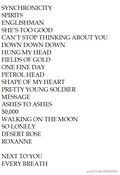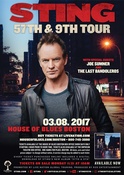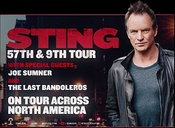
Sting is sharp as ever at House of Blues...
Taking the stage at the sold-out House of Blues on Wednesday night, Sting recounted his history of performing in Boston, both with the Police and solo, cataloging a series of stages - the Rathskeller, the Paradise, the Orpheum, Boston Garden - that traced a gradual expansion to superstardom.
As go venue size and career longevity, so too, typically, goes a performer’s tour setup. So it was all the more fascinating that Wednesday’s concert defied the usual pattern of legacy artists bloating their shows with ever more musicians to fill out the space and the sound. Four decades after the first Police record, Sting anchored a four-man band whose two-guitar attack kept things sharp throughout.
In fact, save for the sequenced keyboard snaking through “Desert Rose” as the only apparent cheat, efficiency was the watchword at nearly every turn. The backing vocalists, for example, were simply members of the opening acts joining in. Even the show’s overall lineup flowed cleanly. After appearing at the top to sing the moody English-folk melody of “Heading South on the Great North Road,” Sting ceded the stage to his son Joe Sumner, whose brief acoustic performance had a joyful intensity, without the songwriting discipline to make it work. Sumner handed the microphone directly to the Last Bandoleros, who came out on fire and just kept burning with twangy, smoldering rock ’n’ roll laced with the boot-stomping, accordion-fueled kick of Tex-Mex.
After a scant 15-minute break, Sting returned with the knife’s edge of “Synchronicity II,” a song about societal dysfunction and a slate-clearing cataclysm, and playing “Spirits in the Material World” and “Englishman in New York” immediately afterward seemed like distinct political commentary. But Sting didn’t call attention to it, and other songs were just as pointed in other ways. The thrum of “50,000” gave way to a high-tension-wire roar, and “Petrol Head” was tough, with stinging, slithering guitar leads. “Pretty Young Soldier,” meanwhile, rolled with soft swells and surges.
Aided by his still-undimmed reedy tenor, the singer brought plenty of energy to such decades-old songs as “So Lonely,” with its flattened-reggae verses and pogoing chorus, and the propulsive New Wave of “Next to You.” Sting ended as he began, fingerpicking the folk-inspired “The Empty Chair,” its association with murdered journalist James Foley another political statement. With a lone electric guitar providing background atmosphere, it had all it needed and nothing more.
(c) The Boston Globe by Marc Hirsh




